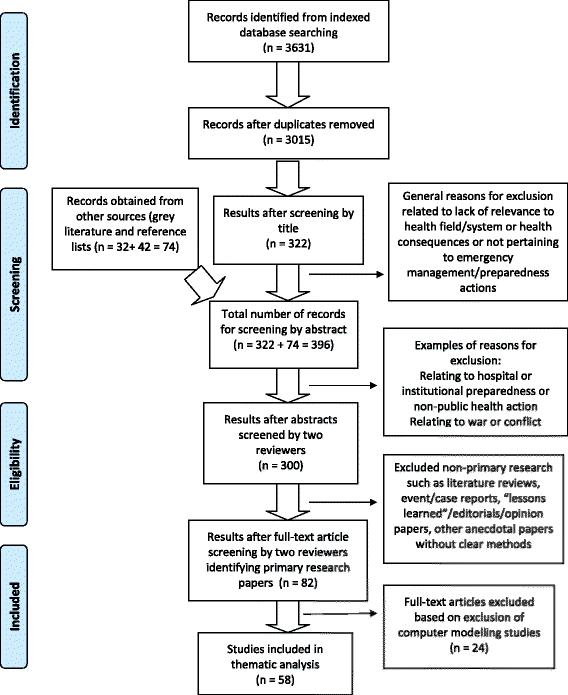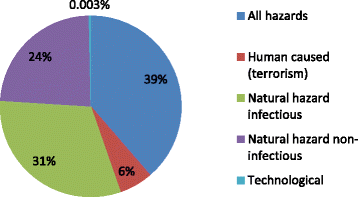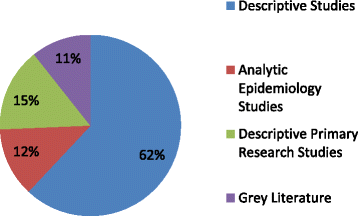The evidence base of primary research in public health emergency preparedness: a scoping review and stakeholder consultation
- PMID: 25925775
- PMCID: PMC4415223
- DOI: 10.1186/s12889-015-1750-1
The evidence base of primary research in public health emergency preparedness: a scoping review and stakeholder consultation
Abstract
Background: Effective public health emergency preparedness and response systems are important in mitigating the impact of all-hazards emergencies on population health. The evidence base for public health emergency preparedness (PHEP) is weak, however, and previous reviews have noted a substantial proportion of anecdotal event reports. To investigate the body of research excluding the anecdotal reports and better understand primary and analytical research for PHEP, a scoping review was conducted with two objectives: first, to develop a thematic map focused on primary research; and second, to use this map to inform and guide an understanding of knowledge gaps relevant to research and practice in PHEP.
Methods: A scoping review was conducted based on established methodology. Multiple databases of indexed and grey literature were searched based on concepts of public health, emergency, emergency management/preparedness and evaluation/evidence. Inclusion and exclusion criteria were applied iteratively. Primary research studies that were evidence-based or evaluative in nature were included in the final group of selected studies. Thematic analysis was conducted for this group. Stakeholder consultation was undertaken for the purpose of validating themes and identifying knowledge gaps. To accomplish this, a purposive sample of researchers and practicing professionals in PHEP or closely related fields was asked to complete an online survey and participate in an in-person meeting. Final themes and knowledge gaps were synthesized after stakeholder consultation.
Results: Database searching yielded 3015 citations and article selection resulted in a final group of 58 articles. A list of ten themes from this group of articles was disseminated to stakeholders with the survey questions. Survey findings resulted in four cross-cutting themes and twelve stand-alone themes. Several key knowledge gaps were identified in the following themes: attitudes and beliefs; collaboration and system integration; communication; quality improvement and performance standards; and resilience. Resilience emerged as both a gap and a cross-cutting theme. Additional cross-cutting themes included equity, gender considerations, and high risk or at-risk populations.
Conclusions: In this scoping review of the literature enhanced by stakeholder consultation, key themes and knowledge gaps in the PHEP evidence base were identified which can be used to inform future practice-oriented research in PHEP.
Figures



Similar articles
-
Public health emergency preparedness for infectious disease emergencies: a scoping review of recent evidence.BMC Public Health. 2023 Mar 2;23(1):420. doi: 10.1186/s12889-023-15313-7. BMC Public Health. 2023. PMID: 36864415 Free PMC article.
-
Identifying and Prioritizing Information Needs and Research Priorities of Public Health Emergency Preparedness and Response Practitioners.Disaster Med Public Health Prep. 2017 Oct;11(5):552-561. doi: 10.1017/dmp.2016.198. Epub 2017 Mar 23. Disaster Med Public Health Prep. 2017. PMID: 28330513 Free PMC article.
-
Public Health Emergency Preparedness and Response Workforce Competencies: Developing and Supporting the Next Generation of Practitioners.Disaster Med Public Health Prep. 2025 May 30;19:e131. doi: 10.1017/dmp.2025.10068. Disaster Med Public Health Prep. 2025. PMID: 40443288
-
Development of a public health emergency preparedness competency model for European Union countries.Euro Surveill. 2018 Dec;23(49):1700631. doi: 10.2807/1560-7917.ES.2018.23.48.1700631. Euro Surveill. 2018. PMID: 30621822 Free PMC article.
-
Public Health System Research in Public Health Emergency Preparedness in the United States (2009-2015): Actionable Knowledge Base.Am J Public Health. 2017 Sep;107(S2):e1-e6. doi: 10.2105/AJPH.2017.304051. Am J Public Health. 2017. PMID: 28892437 Free PMC article. Review.
Cited by
-
Is the Plural of Anecdote Data? Creating Evidence-Based Policy for Mass Casualty Incidents.Am J Public Health. 2019 Feb;109(2):189-190. doi: 10.2105/AJPH.2018.304889. Am J Public Health. 2019. PMID: 30649933 Free PMC article. No abstract available.
-
Mandatory, voluntary, repetitive, or one-off post-migration follow-up for tuberculosis prevention and control: A systematic review.PLoS Med. 2023 Jan 31;20(1):e1004030. doi: 10.1371/journal.pmed.1004030. eCollection 2023 Jan. PLoS Med. 2023. PMID: 36719863 Free PMC article.
-
Extending the Reach of Pediatric Emergency Preparedness: A Virtual Tabletop Exercise Targeting Children's Needs.Public Health Rep. 2019 Jul-Aug;134(4):344-353. doi: 10.1177/0033354919849880. Epub 2019 May 16. Public Health Rep. 2019. PMID: 31095469 Free PMC article.
-
Digital Technologies to Enhance Infectious Disease Surveillance in Tanzania: A Scoping Review.Healthcare (Basel). 2023 Feb 6;11(4):470. doi: 10.3390/healthcare11040470. Healthcare (Basel). 2023. PMID: 36833004 Free PMC article.
-
Public health emergency preparedness: a framework to promote resilience.BMC Public Health. 2018 Dec 5;18(1):1344. doi: 10.1186/s12889-018-6250-7. BMC Public Health. 2018. PMID: 30518348 Free PMC article.
References
-
- Marquis M. Lac-megantic pollution downplayed by Quebec government. The Canadian Press; 2013. http://www.ctvnews.ca/health/health-headlines/quebec-gov-t-downplays-con....
-
- Alberta mobilizes to fight public health threats in flooding aftermath. [http://crofsblogs.typepad.com/h5n1/2013/06/alberta-mobilizes-to-fight-pu...]
Publication types
MeSH terms
Grants and funding
LinkOut - more resources
Full Text Sources
Other Literature Sources
Miscellaneous

